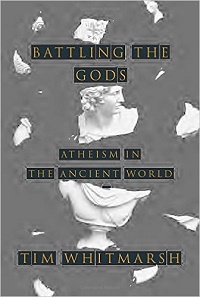
Atheism Has Been Around Just As Long As Religion
- By Elisa Meyer --
- 24 Feb 2016 --

The ancient roots of atheism are presented in author Tim Whitmarsh’s book Battling the Gods.
Tim Whitmarsh, a Cambridge University academic, in his book Battling the Gods, said that atheism dates back to the ancient world. This challenges the assumption that human beings tend to naturally believe in the existence of gods.
Atheism Has Been Around Just As Long As Religion[/tweetthis]
Whitmarsh, who teaches Greek culture, gives a number of examples by which he tries to prove that atheism was present in ancient Greece where polytheism was the norm. The author says that it is an attempt to dig out ancient atheism from beneath the rubble dumped above it by Christian criticism over millennia.

The book states that rather than setting up judgments centered on scientific reasons, the early atheists made what appeared to be the universal objections concerning religion's paradoxical nature, the important fact that it tells you to accept a number of things which are absent in this world. The fact is that this has occurred thousands of years before the suggestion that disbelief exists in a number of cultures, and this has always been the case.
Atheism isn't a sign of religious decline. It's an ancient sign of religious evolution away from dying theologies. https://t.co/4PE3YEYV2o
— Lincoln Cannon (@LincolnCannon) February 19, 2016
The author describes the atheistic writings of authors like Xenophanes of Colophon. The latter lived approximately 570 to 475 B.C.E. and was contemporary with the Judaism of the Second Temple. He lived in an era much before Christianity and Islam. The proof is found in Plato's writings in the 4th century B.C.E., where he wrote that non-believers in his time were the first ones to hold this view about gods.
Since the ancient history of atheism is not written down, Whitmarsh suggests its absence from both the sides of current atheist or monotheist debate. Even as atheists show religion as a relic from a primitive and earlier stage of development of humans, the religious universalism idea was also created partly on the idea that the earlier societies were religious in nature as humans' belief in God is by default.
According to the author, both these perspectives are wrong. He suggests that believers refer to atheism like it is a modern western culture pathology, which will soon pass. Atheism was also strongly present in ancient times.



















